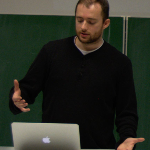Metaphoric Change - Test Set, Annotation Data and Results
- Type
-
ExperimentData
- Author
-
Dominik Schlechtweg, Stefanie Eckmann, Enrico Santus, Sabine Schulte im Walde and Daniel Hole
- Description
-
This data collection supplementing the paper referenced below contains:
- a metaphoric change test set with 95 German lexemes divided into two classes: (i) lexemes for which the authors found metaphoric change or (ii) no semantic change to occur in Deutsches Textarchiv (DTA). It comes as a tab-separated text file where each line of changing lexemes has the form
lexeme POS class change_date frequency_around_change_date description source
For every metaphoric lexeme there is exactly one stable lexeme from the same frequency area in order to balance the test set. Frequency information on any stable lexeme is relative to the corresponding metaphoric lexeme. Each line of a stable lexeme has the form
lexeme POS class first_occurrence_date frequency_around_change_date description source
- a rank resulting from the annotation of 560 use pairs of a subset of the metaphoric change test set measuring the increase of metaphoric uses over time for each lexeme;
- the annotation guidelines;
- the annotators judgements of all 560 uses. A source file is given allowing reconstruction of the date of each use in a pair from the judgement files and
- the predicted ranks for the lexemes in the metaphoric change test set for each measure examined.
Find more information in the paper referenced below.
- a metaphoric change test set with 95 German lexemes divided into two classes: (i) lexemes for which the authors found metaphoric change or (ii) no semantic change to occur in Deutsches Textarchiv (DTA). It comes as a tab-separated text file where each line of changing lexemes has the form
- Reference
-
Dominik Schlechtweg, Stefanie Eckmann, Enrico Santus, Sabine Schulte im Walde and Daniel Hole. 2017. German in Flux: Detecting Metaphoric Change via Word Entropy. In Proceedings of CoNLL 2017. Vancouver, Canada, 2017.
- Download
- Related Resources

Dominik Schlechtweg
Dr.Postdoc

Sabine Schulte im Walde
Prof. Dr.Akademische Rätin (Associate Professor)


